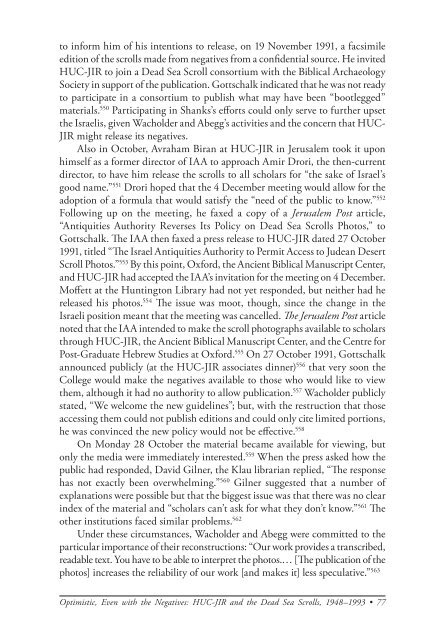The American Jewish Archives Journal, Volume LXI 2009, Number 1
The American Jewish Archives Journal, Volume LXI 2009, Number 1
The American Jewish Archives Journal, Volume LXI 2009, Number 1
Create successful ePaper yourself
Turn your PDF publications into a flip-book with our unique Google optimized e-Paper software.
to inform him of his intentions to release, on 19 November 1991, a facsimile<br />
edition of the scrolls made from negatives from a confidential source. He invited<br />
HUC-JIR to join a Dead Sea Scroll consortium with the Biblical Archaeology<br />
Society in support of the publication. Gottschalk indicated that he was not ready<br />
to participate in a consortium to publish what may have been “bootlegged”<br />
materials. 550 Participating in Shanks’s efforts could only serve to further upset<br />
the Israelis, given Wacholder and Abegg’s activities and the concern that HUC-<br />
JIR might release its negatives.<br />
Also in October, Avraham Biran at HUC-JIR in Jerusalem took it upon<br />
himself as a former director of IAA to approach Amir Drori, the then-current<br />
director, to have him release the scrolls to all scholars for “the sake of Israel’s<br />
good name.” 551 Drori hoped that the 4 December meeting would allow for the<br />
adoption of a formula that would satisfy the “need of the public to know.” 552<br />
Following up on the meeting, he faxed a copy of a Jerusalem Post article,<br />
“Antiquities Authority Reverses Its Policy on Dead Sea Scrolls Photos,” to<br />
Gottschalk. <strong>The</strong> IAA then faxed a press release to HUC-JIR dated 27 October<br />
1991, titled “<strong>The</strong> Israel Antiquities Authority to Permit Access to Judean Desert<br />
Scroll Photos.” 553 By this point, Oxford, the Ancient Biblical Manuscript Center,<br />
and HUC-JIR had accepted the IAA’s invitation for the meeting on 4 December.<br />
Moffett at the Huntington Library had not yet responded, but neither had he<br />
released his photos. 554 <strong>The</strong> issue was moot, though, since the change in the<br />
Israeli position meant that the meeting was cancelled. <strong>The</strong> Jerusalem Post article<br />
noted that the IAA intended to make the scroll photographs available to scholars<br />
through HUC-JIR, the Ancient Biblical Manuscript Center, and the Centre for<br />
Post-Graduate Hebrew Studies at Oxford. 555 On 27 October 1991, Gottschalk<br />
announced publicly (at the HUC-JIR associates dinner) 556 that very soon the<br />
College would make the negatives available to those who would like to view<br />
them, although it had no authority to allow publication. 557 Wacholder publicly<br />
stated, “We welcome the new guidelines”; but, with the restruction that those<br />
accessing them could not publish editions and could only cite limited portions,<br />
he was convinced the new policy would not be effective. 558<br />
On Monday 28 October the material became available for viewing, but<br />
only the media were immediately interested. 559 When the press asked how the<br />
public had responded, David Gilner, the Klau librarian replied, “<strong>The</strong> response<br />
has not exactly been overwhelming.” 560 Gilner suggested that a number of<br />
explanations were possible but that the biggest issue was that there was no clear<br />
index of the material and “scholars can’t ask for what they don’t know.” 561 <strong>The</strong><br />
other institutions faced similar problems. 562<br />
Under these circumstances, Wacholder and Abegg were committed to the<br />
particular importance of their reconstructions: “Our work provides a transcribed,<br />
readable text. You have to be able to interpret the photos.… [<strong>The</strong> publication of the<br />
photos] increases the reliability of our work [and makes it] less speculative.” 563<br />
Optimistic, Even with the Negatives: HUC-JIR and the Dead Sea Scrolls, 1948–1993 • 77

















